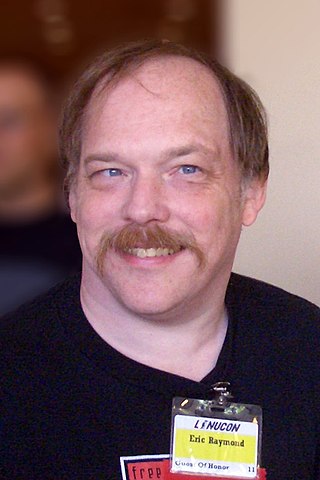
Eric Steven Raymond, often referred to as ESR, is an American software developer, open-source software advocate, and author of the 1997 essay and 1999 book The Cathedral and the Bazaar. He wrote a guidebook for the Roguelike game NetHack. In the 1990s, he edited and updated the Jargon File, published as The New Hacker's Dictionary.

GNU is an extensive collection of free software, which can be used as an operating system or can be used in parts with other operating systems. The use of the completed GNU tools led to the family of operating systems popularly known as Linux. Most of GNU is licensed under the GNU Project's own General Public License (GPL).

Open-source licenses facilitate free and open-source software (FOSS) development. Intellectual property (IP) laws restrict the modification and sharing of creative works. Free and open-source software licenses use these existing legal structures for the inverse purpose of granting freedoms that promote sharing and collaboration. They grant the recipient the rights to use the software, examine the source code, modify it, and distribute the modifications. These licenses target computer software where source code can be necessary to create modifications. They also cover situations where there is no difference between the source code and the executable program distributed to end users. Open-source licenses can cover hardware, infrastructure, drinks, books, and music.
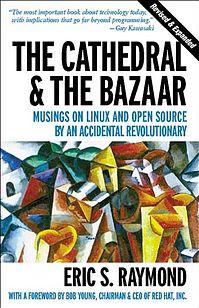
The Cathedral and the Bazaar: Musings on Linux and Open Source by an Accidental Revolutionary is an essay, and later a book, by Eric S. Raymond on software engineering methods, based on his observations of the Linux kernel development process and his experiences managing an open source project, fetchmail. It examines the struggle between top-down and bottom-up design. The essay was first presented by Raymond at the Linux Kongress on May 27, 1997 in Würzburg (Germany) and was published as the second chapter of the same‑titled book in 1999.
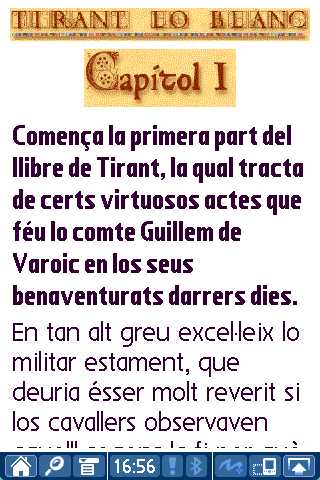
Plucker is an offline Web and free e-book reader for Palm OS based handheld devices, Windows Mobile devices, and other PDAs. Plucker contains POSIX tools, scripts, and "conduits" which work on Linux, Mac OS X, Microsoft Windows, and Unix. Web pages can be processed, compressed, and transferred to the PDA for viewing by the Plucker viewer.

Open-source software (OSS) is computer software that is released under a license in which the copyright holder grants users the rights to use, study, change, and distribute the software and its source code to anyone and for any purpose. Open-source software may be developed in a collaborative, public manner. Open-source software is a prominent example of open collaboration, meaning any capable user is able to participate online in development, making the number of possible contributors indefinite. The ability to examine the code facilitates public trust in the software.
Pamela Jones, commonly known as PJ, is the creator and was editor of Groklaw, a website that covered legal news of interest to the free and open-source software community. Jones is an Open Source advocate who previously trained and worked as a paralegal.

Timothy O'Reilly is an Irish-American author and publisher, who is the founder of O'Reilly Media. He popularised the terms open source and Web 2.0.
Free as in Freedom: Richard Stallman's Crusade for Free Software (ISBN 0-596-00287-4) is a free book licensed under the GNU Free Documentation License about the life of Richard Stallman, written by Sam Williams and published by O'Reilly Media on March 1, 2002.
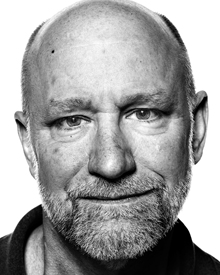
Keith Bostic is an American software engineer and one of the key people in the history of Berkeley Software Distribution (BSD) Unix and open-source software.
SlashNET is a medium-sized, independently operated Internet Relay Chat (IRC) network. Originally sponsored by Slashdot and founded in 1998, in 1999 SlashNET split off to become its own entity. A few well-known communities and projects maintain an IRC presence at SlashNET, including #g7, #totse (Totse), #idiots-club, #mefi, various Penny Arcade-related communities, #Twitterponies, and #rags. As of 2012 it is ranked in the top 40 networks by IRC.Netsplit.de, with an estimated relatively constant 1700 users, and #25/737 by SearchIRC.com.
The Common Development and Distribution License (CDDL) is a free and open-source software license, produced by Sun Microsystems, based on the Mozilla Public License (MPL). Files licensed under the CDDL can be combined with files licensed under other licenses, whether open source or proprietary. In 2005 the Open Source Initiative approved the license. The Free Software Foundation (FSF) considers it a free software license, but one which is incompatible with the GNU General Public License (GPL).

Russell Nelson is an American computer programmer. He was a founding board member of the Open Source Initiative and briefly served as its president in 2005.
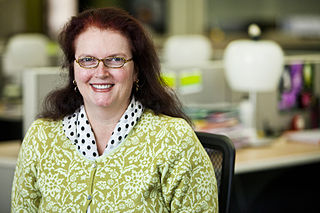
Danese Cooper is an American programmer, computer scientist and advocate of open source software.

Heinrich Magnus Manske is a German biochemist, who is a leading researcher on malaria. He is a senior staff scientist at the Wellcome Sanger Institute in Cambridge, UK and a software developer of one of the first versions of the MediaWiki software, which powers Wikipedia and a number of other websites.
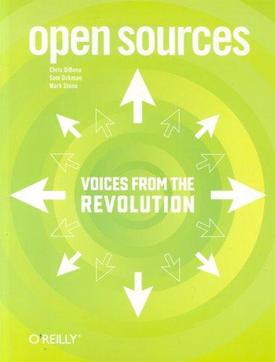
Open Sources: Voices from the Open Source Revolution is a book published by O'Reilly Media. It is an anthology of essays written by luminaries of the open source and free software movements. The essays variously chronicle aspects of free software history, describe various philosophical positions, or sketch groups important to the movements.
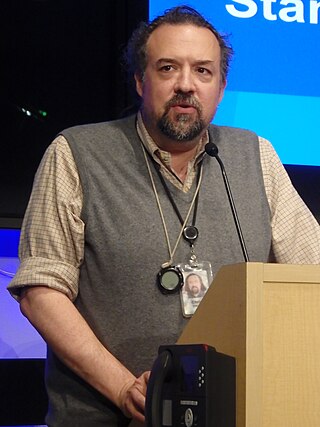
Chris DiBona was the director of open source at Google from August 2004 until January 2023.

FLOSS Weekly is a free and open-source software (FLOSS) themed netcast from the TWiT Network. The show premiered on April 7, 2006, and features interviews with prominent guests from the free software/open source community. It was originally hosted by Leo Laporte; his cohost for the first seventeen episodes was Chris DiBona and subsequently Randal Schwartz. In May 2010, Schwartz took over from Laporte as lead host. May 2020 saw Doc Searls take over the host role in episode 578.

LugRadio was a British podcast on the topic of Linux and events in the free and open source software communities, as well as coverage of technology, digital rights and politics.
"Ignore all rules" (IAR) is a policy in the English Wikipedia. It reads: "If a rule prevents you from improving or maintaining Wikipedia, ignore it." [emphasis in original]. The rule was proposed by Wikipedia co-founder Larry Sanger to encourage editors to add information without focusing excessively on formatting, though Sanger later criticized the rule's effects on the community.














